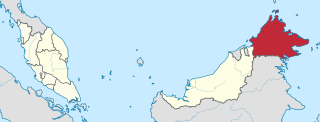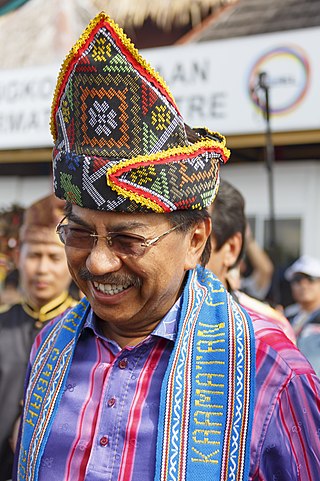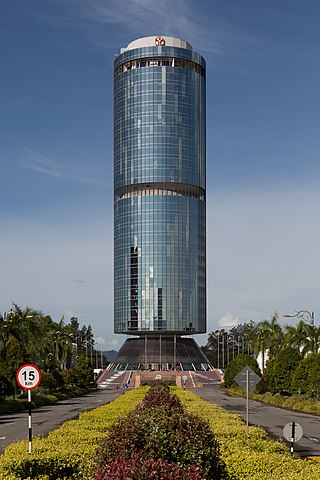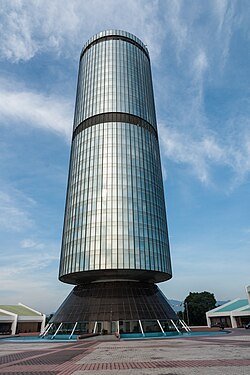
Sabah is a state of Malaysia located on the northern portion of Borneo, in the region of East Malaysia. Sabah has land borders with the Malaysian state of Sarawak to the southwest and Indonesia's North Kalimantan province to the south. The Federal Territory of Labuan is an island just off Sabah's west coast. Sabah shares maritime borders with Vietnam to the west and the Philippines to the north and east. Kota Kinabalu is the state capital and the economic centre of the state, and the seat of the Sabah State government. Other major towns in Sabah include Sandakan and Tawau. The 2020 census recorded a population of 3,418,785 in the state. It has an equatorial climate with tropical rainforests, abundant with animal and plant species. The state has long mountain ranges on the west side which forms part of the Crocker Range National Park. Kinabatangan River, the second longest river in Malaysia runs through Sabah. The highest point of Sabah, Mount Kinabalu is also the highest point of Malaysia.

Tan Sri Tengku Razaleigh bin Tengku Mohd Hamzah is a Malaysian politician who served as the Member of Parliament (MP) for Gua Musang from August 1986 to November 2022 and for Ulu Kelantan from August 1974 to August 1986. He is the longest-serving MP to date, serving from 1974 to 2022, for 48 years in a row. He is sometimes referred to as the Father of Malaysian Economic Development for playing a pivotal role in establishing and implementing key foundations and policies in Malaysian economy. A descendant of Malay royalty, he is a great-uncle of the current Sultan of Kelantan, Sultan Muhammad V.

Pan Borneo Highway, also known as Trans-Borneo Highway or Trans-Kalimantan Highway, is a road network on Borneo Island connecting two Malaysian states, Sabah and Sarawak, with Brunei and Kalimantan region in Indonesia. The highway is numbered AH150 in the Asian Highway Network and as Federal Route 1 in Sarawak. In Sabah, the route numbers given are 1, 13 and 22. The highway is a joint project between both governments which started as soon as the formation of Malaysia in 1963 which comprised Malaya, Sabah, Sarawak and Singapore. The lack of a road network system in Sarawak was the main factor of the construction.

Musa Bin Haji Aman is a Malaysian politician who served as the 14th Chief Minister, State Minister of Finance from March 2003 to May 2018, Member of the Sabah State Legislative Assembly (MLA) for Sungai Sibuga from February 1994 to September 2020, the former State Chairman of Barisan Nasional (BN) and United Malays National Organisation (UMNO) of Sabah. In April 2023, He become the direct member of Gabungan Rakyat Sabah (GRS). He is the longest-serving Chief Minister of Sabah by holding the position for 15 years and is the older half brother of Anifah Aman, the Special Advisor to the Chief Minister of Sabah on International Relations and Foreign Investments, President of Love Sabah Party (PCS) and former Minister of Foreign Affairs.

Datu Mustapha bin Datu Harun, or Tun Mustapha for short, was a Malaysian politician who served as the 3rd Chief Minister of Sabah from May 1967 to November 1975 and the 1st Yang Di-Pertua Negara from September 1963 to September 1965 and President of the United Sabah National Organisation (USNO). He is considered by some to be one of the founding leaders of Sabah and was an important party in the negotiations leading to the formation of Malaysia on 16 September 1963. He is sometimes known as the "Father of Independence of Sabah" and also the "Father of Development of Sabah".

Tun Mustapha Tower is a 122-metre, 30-story glass tower in Kota Kinabalu, Sabah, Malaysia. It was built in 1976 by Mori Building Company, a Japanese builder. The building was formerly named Yayasan Sabah Tower as it housed Sabah Foundation, a state-sponsored foundation to promote education and economic development in the state. In 2001, the tower was renamed to honour Tun Datu Mustapha, a former Sabah chief minister.

The 1986 Sabah riots, also known as The Silent Riot, occurred between March and May in various locations around the state of Sabah, Malaysia. The riots centred mainly in the capital Kota Kinabalu, as well as in the towns of Tawau and Sandakan. On 12 March, seven plastic explosives were detonated in Kota Kinabalu. A bomb was also detonated in Tawau. At least five bombs exploded in Sandakan killing one newspaper vendor and injuring a senior Police Field Force officer. The riots resulted in the death of 5 people.

Sabah People's United Front or in Malay Parti Bersatu Rakyat Jelata Sabah is more commonly known by its abbreviation BERJAYA, was a political party based in the state of Sabah, Malaysia. BERJAYA was formed by former United Sabah National Organisation (USNO) secretary-general Harris Salleh who was later joined by Fuad Stephens, who served as the first Chief Minister of Sabah as well as president of the United Pasokmomogun Kadazan Organisation (UPKO). Stephens became the fifth Chief Minister after BERJAYA won the 1976 state election in April but died in June the same year, being succeeded by Salleh. The party had been a partner of Barisan Nasional (BN), the then ruling coalition of Malaysia since its inception on 15 July 1975.
The United Sabah National Organisation was a political party in North Borneo and later Sabah, Malaysia. The widely known Sabah's Muslim indigenous especially Suluk-Bajau ethnic based party was founded by the third Chief Minister of Sabah; Mustapha Harun in December 1961.
Project IC is the name used in Malaysia to describe the allegation of systematic granting of citizenship to immigrants by giving them identity cards and subsequently its current iteration, the MyKad. The alleged practice is centred in the state of Sabah in East Malaysia. The term is used mainly by the media as well as other political commentators and the general public. Another term used is Project M, the "M" referring to former prime minister Mahathir Mohamad due to his alleged involvement in the spearheading of the project.

The history of Sabah can be traced back to about 23–30,000 years ago when evidence suggests the earliest human settlement in the region existed. The history is interwoven with the history of Brunei and the history of Malaysia, which Sabah was previously part of and is currently part of respectively. The earliest recorded history of Sabah being part of any organised civilisation began in the early 15th century during the thriving era of the Sultanate of Brunei. Prior to this, early inhabitants of the land lived in predominantly tribal societies, although such tribal societies had continued to exist until the 1900s. The eastern part of Sabah was ceded to the Sultan of Sulu by the Sultan of Brunei in 1658 for the former helping a victory over Brunei enemies, but many sources stated it had not been ceded at all. By the late 19th century, both territories previously owned by Sultan of Brunei and Sultan of Sulu was granted to British syndicate and later emerged as British North Borneo under the management of the North Borneo Chartered Company. Sabah became a protectorate of the United Kingdom in 1888 and subsequently became a Crown colony from 1946 until 1963, during which time it was known as Crown Colony of North Borneo. On 16 September 1963, Sabah merged with Malaya, Sarawak and Singapore to form Malaysia.

Ahmad Zaidi Adruce bin Muhammed Noor was the fifth Yang di-Pertua Negeri of Sarawak. He was the longest-serving governor of Sarawak, from his inaugural in 1985, to his death in 2000. He was also remembered as the first Sarawakian Bumiputera to receive a MA Degree from a British university.

Wisma Innoprise, is one of the office complex buildings for the Sabah state government. This building was built by Innoprise Corporation Sdn. Bhd (ICSB), an investment arm of Yayasan Sabah. This building houses the offices for ICSB and also a few state government departments or ministries.

Datuk Peter Joinod Mojuntin, PGDK was a politician in the Malaysian state of Sabah and Minister of Municipal Administration in the government of Tun Fuad Stephens. He died along with other politicians in the Double Six Plane Crash in Kota Kinabalu.

The Sabah Chinese Association was a Chinese political party in the North Borneo and the Sabah state of Malaysia.

Datuk Seri Panglima Wilfred Madius Tangau is a Malaysian politician who has served as the Member of Parliament (MP) for Tuaran from November 1999 to March 2008 and again since May 2013. He served as the Deputy Chief Minister and State Minister of Trade and Industry of Sabah in the Sabah Heritage Party (WARISAN) state administration from May 2018 to the collapse of the WARISAN administration in September 2020, Minister of Science, Technology and Innovation from July 2015 to May 2018. He is a member of the United Progressive Kinabalu Organisation (UPKO), a component party of the PH coalition. He has served as the Honorary President of UPKO since January 2023, 2nd President of UPKO from March 2014 to January 2023, when he served in the official capacity from September 2018 to January 2023 and acting capacity from March 2014 following the resignation of Bernard Giluk Dompok to his official assumption of UPKO presidency in September 2018.
Tun Mohd Hamdan bin Abdullah was the fourth Governor of the Malaysian state of Sabah.

Sabah is the third most populous state in Malaysia, with a population of 3,418,785 according to the 2020 Malaysian census. It also has the highest non-citizen population, at 810,443. Although Malaysia is one of the least densely populated countries in Asia, Sabah is particularly sparsely populated. Most of the population is concentrated along coastal areas, with towns and urban centers seeing the most population growth.
The 1976 Sabah state election was held between Monday, 5 April and Saturday, 14 April 1976. This was the third state election to take place, and the first to feature opposition candidates since the first election on 1967, as the second state election on 1971 has all government candidates won uncontested. The state assembly were dissolved on 23 January 1976, and the nomination day was on 18 March 1976.
The 1967 Sabah state election were held between 8 April to 23 April 1967, with nomination day on 8 March 1967. This was the first state election to take place, after Sabah independence from British and subsequently joining Malaysia in 1963.

















